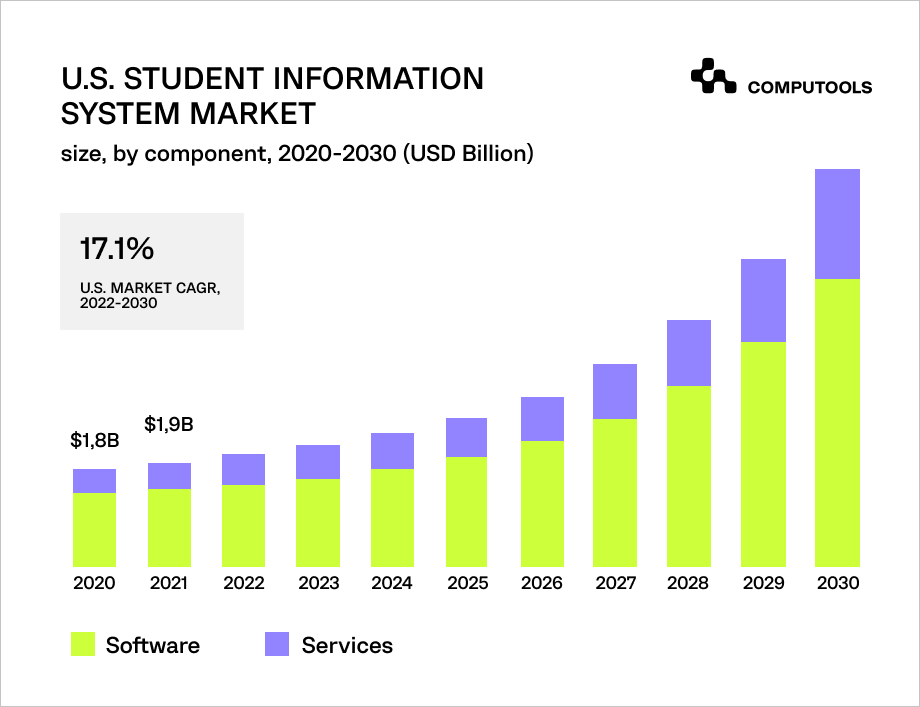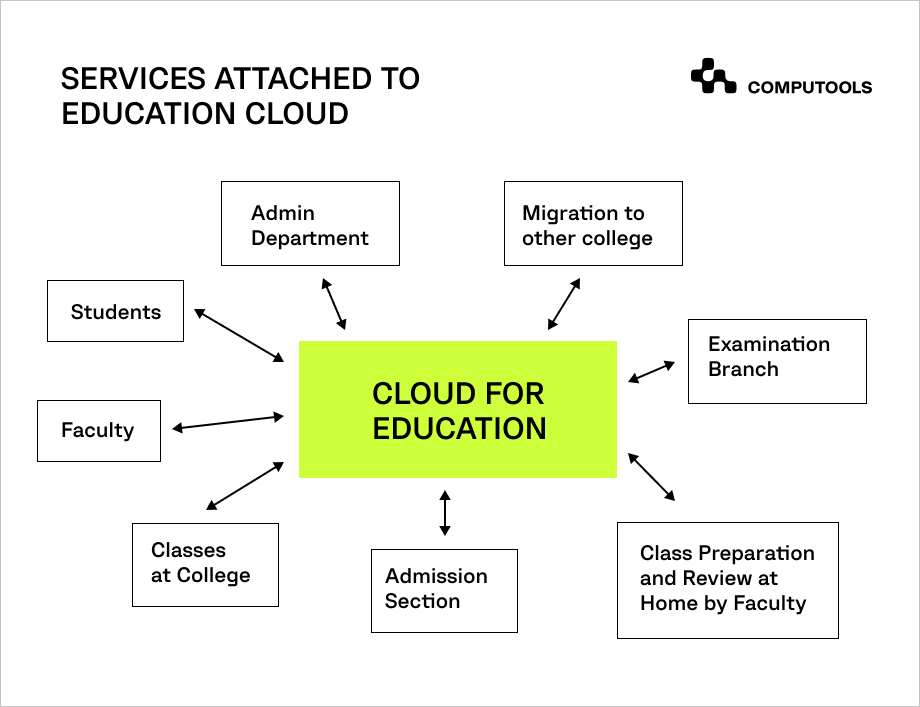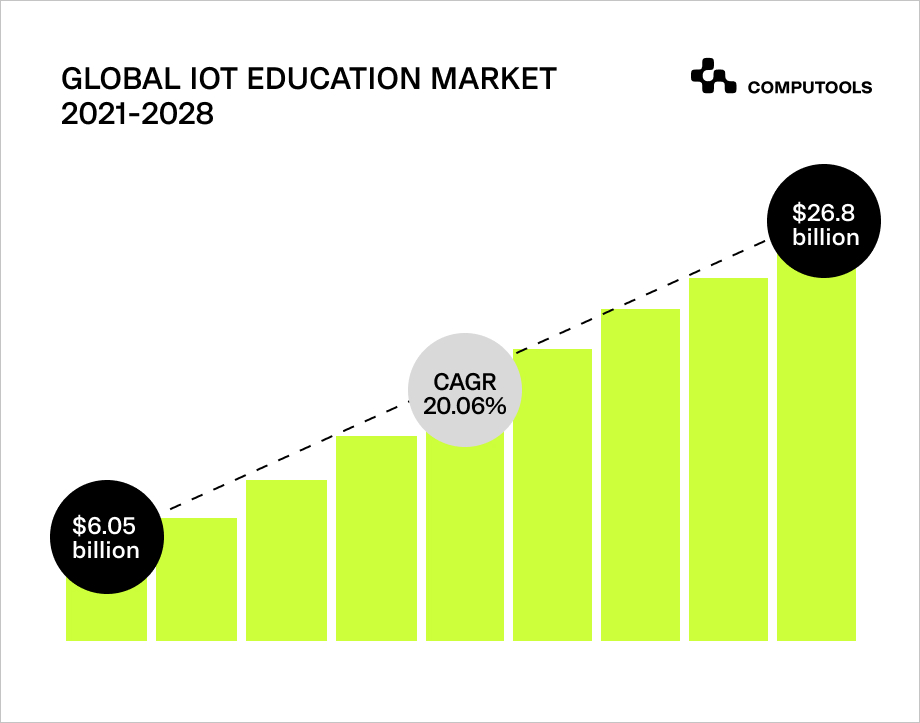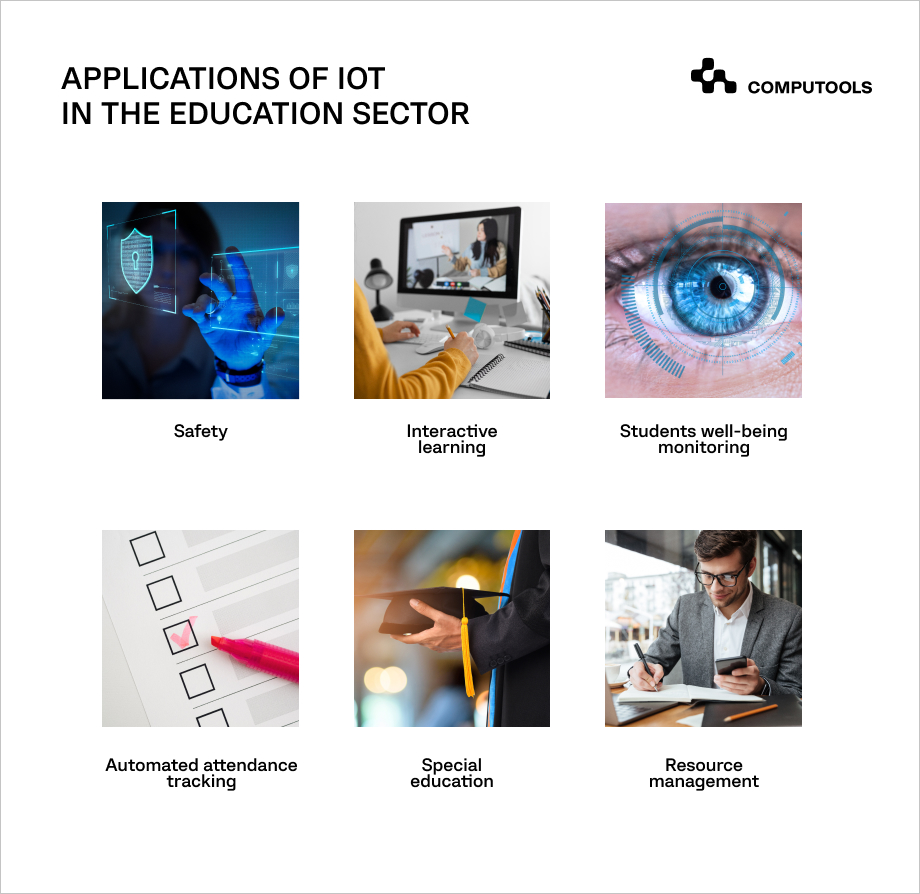Technology is transforming all areas of business. Education is no exception. New technology in education ensures convenient access to educational materials, diversifies traditional teaching methods, enhances the learning process, and reduces teacher workload.
Digitalization in education is inevitable. As you read this, educational organizations all around the globe are rebuilding to achieve digital maturity.
What does the future hold for the education industry? What are the most promising educational technology trends, and how to implement them effectively?
Student information systems (SIS)
Rapid implementation of information management systems is one of the biggest educational technology trends. As a result, the market size of student information systems is valued at 1.9 billion US dollars. It’ll continue to expand at an annual growth rate of 19%.

These systems simplify communication between institutions, students, and parents, and provide a unified electronic document service infrastructure.
Each solution can be easily customized to meet the needs of different educational organizations.
This can include:
• The development of digital services for organizing admissions;
• The creation of digital student portfolios;
• The creation of electronic services for the management of educational processes, including the adjustment of curricula and class schedules;
• The sharing of educational materials among teachers to their students and their parents, as well as among students, as part of joint work;
• The development of personalized courses for students.
As the COVID pandemic drove the demand for online education, SIS has become one of the most demanding technological trends in education, helping connect people and improve the education system.
Big Data & Analytics
Analytics in education is one of the leading educational technology trends. Many universities in North America, Europe, and Asia have already implemented this technology. They use it to streamline academic performance, better understand student attrition rates, analyze students’ behaviors, and personalize course recommendations.
Big data analyzes student personalities, such as temperament, employment, sphere of interests, and how this information aligns with the chosen discipline.
Texas State University, for example, uses big data to personalize education plans and offer relevant academic and career opportunities. As a result, it makes it easier for new students to choose a major.
The approaches to monitoring and evaluating learning are also changing.
Big data solutions show how students learn material, where they show interest the most, how they progress in the learning process, how specific courses influence educational results, and at what stage of educational processes they needed help. Thus, learning becomes more adaptive and student-centered.
The integration of cloud technologies
Integrating custom software solutions into schools isn’t very modern and requires a lot of IT infrastructure maintenance.
This is where SaaS, PaaS, and IaaS solutions come into play. These modern cloud technologies can lower IT infrastructure costs by almost 50%.
Due to the abundance of cloud solutions on the market, the areas of application of cloud tools in education vary greatly.
In education, they’re used for research and teaching, modernizing administrative operations and information systems, and creating new ways of communicating with students and teachers.

One of the key drivers for the adoption of cloud technologies in 2023 will be the need for the transformation of academic activities and competitiveness among higher education institutions.
Artificial intelligence (AI)
Today, artificial intelligence benefits many industries, including education.
AI in education is expected to reach $80 billion at over 45% CAGR from 2022 to 2030.
The main drivers of AI adoption are:
• The growing number of cloud technologies;
• The demand for intelligent tutoring systems;
• The exponential growth of digital data at universities.
Educational organizations implement AI to personalize and adapt students’ education, strengths and weaknesses, and build an individual academic plan that can dynamically change as the student progresses.
AI has been widely implemented in different universities providing students with personalized help and guidance in various areas of interest. For example, reminders about academic schedules, office hours, navigation on campus, and other customized information can improve students’ educational experiences.
Educational organizations, in its turn, can analyze and process these requests to improve their services and keep students on track.
Internet of Things (IoT)

In 2023 and beyond, IoT will be one of the hottest technological trends in education. The advancements in smart technologies open new highways for the education industry.
IoT in education is expected to reach $26 billion by 2028.
There are several directions for the use of IoT in education.
One of them concerns security and accounting issues, as well as the control of knowledge and class attendance. In addition, universities and schools harness IoT technologies for student identification. They are actively adopting RFID tags, smart cards, applications, smartwatches, and even video cameras with facial recognition systems.
Digital solutions associated with identification systems can monitor students’ attendance and academic performance and offer personal dashboards with educational materials.
Curtin University in Australia uses the Internet of Things on its campus. The IoT system collects data on classroom and library volume, course attendance, and other important educational metrics of students and teachers. Collected data helps administration and management make the right decisions on the organization of educational processes.
Another area of IoT application is during lectures. Electronic whiteboards, interactive desks with a touch screen, 3D projectors, and smart cameras create a virtual classroom. Special tools to conduct experiments, research, and observations are also in great use.

What does the future hold for technological trends in education?
In post COVID world, where education has moved online, government-run schools, universities, and other educational institutions have begun comprehensive digitalization. Today, digitalization isn’t a matter of trends but a necessity.
Luckily, with the growing number of technology trends in education, educational organizations have many opportunities to digitalize their infrastructure effortlessly and modernly.
The sooner you take advantage of these technologies, the better.
If you want to implement any of these technologies but don’t know where to start, reach out to info@computools.com.
Computools
Software Solutions
Computools is a digital consulting and software development company that delivers innovative solutions to help businesses unlock tomorrow.









“Computools was selected through an RFP process. They were shortlisted and selected from between 5 other suppliers. Computools has worked thoroughly and timely to solve all security issues and launch as agreed. Their expertise is impressive.”